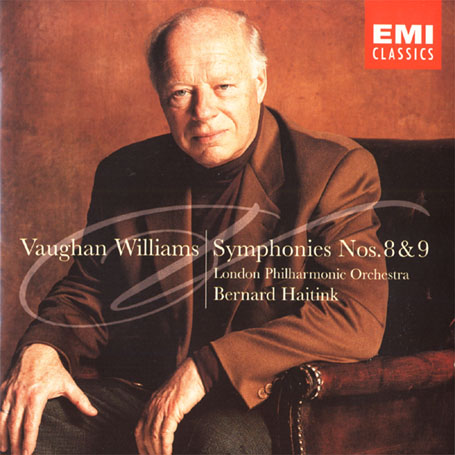Vaughan Williams Symphonies Nos 8 and 9
View record and artist detailsRecord and Artist Details
Composer or Director: Ralph Vaughan Williams
Label: EMI
Magazine Review Date: 5/2001
Media Format: CD or Download
Media Runtime: 67
Mastering:
DDD
Catalogue Number: 557086-2

Tracks:
| Composition | Artist Credit |
|---|---|
| Symphony No. 8 |
Ralph Vaughan Williams, Composer
Bernard Haitink, Conductor London Philharmonic Orchestra Ralph Vaughan Williams, Composer |
| Symphony No. 9 |
Ralph Vaughan Williams, Composer
Bernard Haitink, Conductor London Philharmonic Orchestra Ralph Vaughan Williams, Composer |
Author:
A friendly word of warning to VW fans everywhere: Haitink will make you think again. No ‘little’ Eighth, this, rather an unapologetically big-scale conception, full of doughty integrity and always seeking out the intuitive logic that binds VW’s symphonic thinking. If the Scherzo alla marcia falls short in terms of twinkling good humour here, the preceding, inimitably subtitled Variazioni senza tema unfolds with a revelatory sweep and purposefulness.
Likewise, the finale by and large forfeits celebratory pomp and glitter in favour of a sinewy, intriguingly defiant strength entirely consistent with Haitink’s patient view as a whole. Most distinctive of all is the sublime Cavatina for strings: very measured, raptly concentrated and imbued with a lofty serenity to relate it all the more movingly to the great Romanza of VW’s Fifth Symphony. Some listeners may find the emotional temperature set just a few notches too low for comfort, but, as a thought-provoking alternative to Barbirolli (Pye, 5/66 – nla), Handley and Slatkin (my own top choices, the last-named now only available as part of a six-CD set), Haitink’s Eighth certainly earns its spurs.
Turning to the craggy, questing Ninth, both Slatkin and Handley have given of their considerable best in this endlessly fascinating, wonderfully vital utterance. On balance, however, I’m inclined to rate Haitink’s resplendent new version as the finest yet, a thrillingly convinced and convincing demonstration of the timeless universality of VW’s masterpiece. I love the clear-sighted dedication and stoic grandeur of the opening Moderato maestoso. Not only is Haitink meticulously faithful to both the letter and spirit of the score, VW’s argument evolves with a nobility and wholeness that grip from first measure to last. Those ff tenuto strings at Fig 2 (1'02) in the second movement have just the right ‘mud on boots’ feel to them, and, like Handley before him, Haitink doesn’t overplay his hand in the central lyrical episode (its chaste beauty all the more affecting as a consequence). The hobgoblins of the Scherzo cackle with plenty of malevolent glee, yet Haitink proves just as tenderly responsive to the strings’ ravishing cantabile e sostenuto dialogue between Figs 30 and 34 (from 4'06 to 4'42).
It’s in the awesome final movement, though, where Haitink really surpasses himself: VW’s monolithic vision is surveyed with an organic power and cumulative impact that left this listener, at any rate, dumb struck with admiration and gratitude.
Throughout, the LPO play marvellously for their former chief, and EMI’s Abbey Road sound is excellent, truthful in timbre and expertly balanced (listen out for some handsomely extended bass sonorities). A distinguished achievement and absolutely not to be missed. Now, what chance a Job from this same exemplary partnership
Likewise, the finale by and large forfeits celebratory pomp and glitter in favour of a sinewy, intriguingly defiant strength entirely consistent with Haitink’s patient view as a whole. Most distinctive of all is the sublime Cavatina for strings: very measured, raptly concentrated and imbued with a lofty serenity to relate it all the more movingly to the great Romanza of VW’s Fifth Symphony. Some listeners may find the emotional temperature set just a few notches too low for comfort, but, as a thought-provoking alternative to Barbirolli (Pye, 5/66 – nla), Handley and Slatkin (my own top choices, the last-named now only available as part of a six-CD set), Haitink’s Eighth certainly earns its spurs.
Turning to the craggy, questing Ninth, both Slatkin and Handley have given of their considerable best in this endlessly fascinating, wonderfully vital utterance. On balance, however, I’m inclined to rate Haitink’s resplendent new version as the finest yet, a thrillingly convinced and convincing demonstration of the timeless universality of VW’s masterpiece. I love the clear-sighted dedication and stoic grandeur of the opening Moderato maestoso. Not only is Haitink meticulously faithful to both the letter and spirit of the score, VW’s argument evolves with a nobility and wholeness that grip from first measure to last. Those ff tenuto strings at Fig 2 (1'02) in the second movement have just the right ‘mud on boots’ feel to them, and, like Handley before him, Haitink doesn’t overplay his hand in the central lyrical episode (its chaste beauty all the more affecting as a consequence). The hobgoblins of the Scherzo cackle with plenty of malevolent glee, yet Haitink proves just as tenderly responsive to the strings’ ravishing cantabile e sostenuto dialogue between Figs 30 and 34 (from 4'06 to 4'42).
It’s in the awesome final movement, though, where Haitink really surpasses himself: VW’s monolithic vision is surveyed with an organic power and cumulative impact that left this listener, at any rate, dumb struck with admiration and gratitude.
Throughout, the LPO play marvellously for their former chief, and EMI’s Abbey Road sound is excellent, truthful in timbre and expertly balanced (listen out for some handsomely extended bass sonorities). A distinguished achievement and absolutely not to be missed. Now, what chance a Job from this same exemplary partnership
Discover the world's largest classical music catalogue with Presto Music.

Gramophone Digital Club
- Digital Edition
- Digital Archive
- Reviews Database
- Full website access
From £8.75 / month
Subscribe
Gramophone Full Club
- Print Edition
- Digital Edition
- Digital Archive
- Reviews Database
- Full website access
From £11.00 / month
Subscribe
If you are a library, university or other organisation that would be interested in an institutional subscription to Gramophone please click here for further information.




